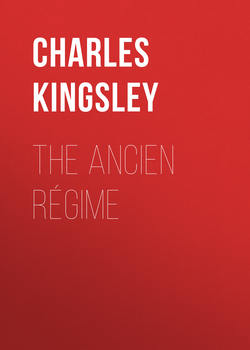The Ancien Régime

Реклама. ООО «ЛитРес», ИНН: 7719571260.
Оглавление
Charles Kingsley. The Ancien Régime
PREFACE
LECTURE I—CASTE
LECTURE II—CENTRALISATION
LECTURE III—THE EXPLOSIVE FORCES
Отрывок из книги
[Delivered at the Royal Institution, London, 1867.]
These Lectures are meant to be comments on the state of France before the French Revolution. To English society, past or present, I do not refer. For reasons which I have set forth at length in an introductory discourse, there never was any Ancien Régime in England.
.....
The mistake of the masses was pardonable. For those suits of armour had once held living men; strong, brave, wise; men of an admirable temper; doing their work according to their light, not altogether well—what man does that on earth?—but well enough to make themselves necessary to, and loyally followed by, the masses whom they ruled. No one can read fairly the “Gesta Dei per Francos in Oriente,” or the deeds of the French Nobility in their wars with England, or those tales—however legendary—of the mediæval knights, which form so noble an element in German literature, without seeing, that however black were these men’s occasional crimes, they were a truly noble race, the old Nobility of the Continent; a race which ruled simply because, without them, there would have been naught but anarchy and barbarism. To their chivalrous ideal they were too often, perhaps for the most part, untrue: but, partial and defective as it is, it is an ideal such as never entered into the mind of Celt or Gaul, Hun or Sclav; one which seems continuous with the spread of the Teutonic conquerors. They ruled because they did practically raise the ideal of humanity in the countries which they conquered, a whole stage higher. They ceased to rule when they were, through their own sins, caught up and surpassed in the race of progress by the classes below them.
But, even when at its best, their system of government had in it—like all human invention—original sin; an unnatural and unrighteous element, which was certain, sooner or later, to produce decay and ruin. The old Nobility of Europe was not a mere aristocracy. It was a caste: a race not intermarrying with the races below it. It was not a mere aristocracy. For that, for the supremacy of the best men, all societies strive, or profess to strive. And such a true aristocracy may exist independent of caste, or the hereditary principle at all. We may conceive an Utopia, governed by an aristocracy which should be really democratic; which should use, under developed forms, that method which made the mediæval priesthood the one great democratic institution of old Christendom; bringing to the surface and utilising the talents and virtues of all classes, even to the lowest. We may conceive an aristocracy choosing out, and gladly receiving into its own ranks as equals, every youth, every maiden, who was distinguished by intellect, virtue, valour, beauty, without respect to rank or birth; and rejecting in turn, from its own ranks, each of its own children who fell below some lofty standard, and showed by weakliness, dulness, or baseness, incapacity for the post of guiding and elevating their fellow-citizens. Thus would arise a true aristocracy; a governing body of the really most worthy—the most highly organised in body and in mind—perpetually recruited from below: from which, or from any other ideal, we are yet a few thousand years distant.
.....